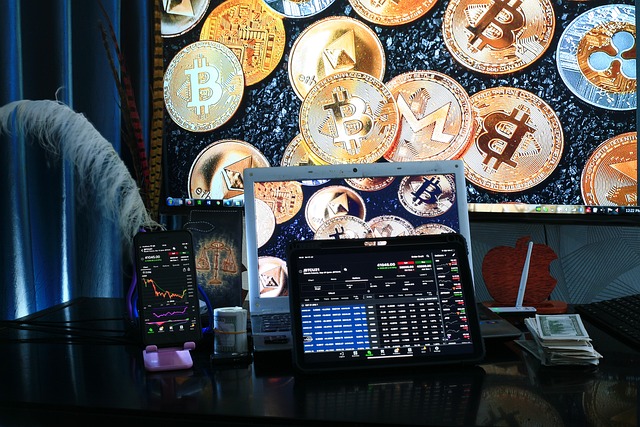Crypto Wallets Explained
Author: Jameson Richman Expert
Published On: 2025-04-07
Prepared by Jameson Richman and our team of experts with over a decade of experience in cryptocurrency and digital asset analysis. Learn more about us.
In the rapidly evolving world of cryptocurrency, understanding crypto wallets is essential for anyone looking to invest, trade, or simply hold digital assets. A crypto wallet is a digital tool that allows users to store and manage their cryptocurrencies securely. With the rise of various cryptocurrencies and exchanges, the importance of choosing the right wallet cannot be overstated. This article will dive deep into the different types of crypto wallets, their functionalities, and how to choose the best one for your needs.
When I first ventured into the world of cryptocurrency, I was overwhelmed by the sheer volume of information available. I tried multiple wallets, each promising security and ease of use, but I faced numerous challenges along the way. My journey was filled with trial and error, and I learned valuable lessons that I want to share with you.

Understanding Crypto Wallets
Crypto wallets can be broadly categorized into two types: hot wallets and cold wallets. Hot wallets are connected to the internet, making them convenient for frequent transactions. However, this connectivity also makes them more vulnerable to hacks. On the other hand, cold wallets are offline storage solutions, providing enhanced security but less accessibility. Understanding the fundamental differences between these two types is crucial for anyone looking to safeguard their digital assets.
During my early days, I primarily used hot wallets because they were easy to set up and allowed me to trade quickly. However, I soon realized that I was putting my assets at risk. One day, I woke up to find that my hot wallet had been compromised. This experience taught me the importance of securing my investments, leading me to explore cold wallets.
Types of Crypto Wallets
There are several types of crypto wallets available, each with its unique features. Here are the most common types:
- Software Wallets: These are applications that you can install on your computer or smartphone. They are user-friendly and suitable for beginners. Software wallets can be further divided into desktop wallets, mobile wallets, and online wallets. Desktop wallets offer more security than mobile wallets but are less convenient for on-the-go transactions. Popular software wallets include Exodus, Electrum, and Mycelium. Each of these wallets has its own set of features, such as built-in exchanges or support for multiple cryptocurrencies, making them versatile options for users.
- Hardware Wallets: These are physical devices that store your cryptocurrencies offline. They are considered one of the safest options available, as they are immune to online threats. Popular hardware wallets include Ledger Nano S, Ledger Nano X, and Trezor. Hardware wallets often come with additional security features such as PIN protection and recovery seed phrases, which are essential for restoring access to your funds in case of loss. It's important to note that while hardware wallets provide excellent security, they can be more expensive than software wallets.
- Paper Wallets: A paper wallet is a physical document that contains your public and private keys. While they are immune to online hacks, they can be easily lost or damaged. It's crucial to store them in a safe place, such as a safe deposit box. Creating a paper wallet requires caution, as using an insecure computer can expose your keys. Services like Bitaddress.org can help you generate a secure paper wallet, but always ensure that you are using a secure and trusted network when creating one.
- Web Wallets: These wallets are hosted on the cloud and can be accessed from any device with an internet connection. They offer convenience but come with security risks, particularly if the service provider is compromised. Always choose reputable web wallets that implement strong security measures. Examples include Coinbase and Blockchain.com. It's advisable to enable two-factor authentication (2FA) and regularly monitor your account for any suspicious activity.
After my unfortunate experience with hot wallets, I decided to invest in a hardware wallet. It was a game-changer for me. I felt a sense of relief knowing that my assets were stored offline, away from potential hackers. I chose a reputable brand and followed the setup instructions carefully, ensuring that I understood how to manage my private keys.
Choosing the Right Wallet
Choosing the right crypto wallet can be daunting, especially with so many options available. Here are some factors to consider:
- Security: Look for wallets that offer features like two-factor authentication (2FA), multi-signature support, and encryption. A wallet that allows you to control your private keys is preferable. Research the wallet's security history and user reviews to gauge its reliability. A wallet with a strong reputation in the community is often a safer choice. Additionally, consider the wallet's recovery options in case of loss or theft.
- User Experience: A user-friendly interface is crucial, especially for beginners. The wallet should have clear instructions and support resources. Consider wallets that offer tutorials or customer support to help you navigate the platform. A well-designed wallet can significantly enhance your overall experience, making it easier to manage your assets.
- Supported Cryptocurrencies: Ensure the wallet supports the cryptocurrencies you plan to store. Some wallets are tailored for specific coins, while others support a wide range. If you plan to diversify your portfolio, choose a wallet with extensive cryptocurrency support. This flexibility can be beneficial as the market evolves, allowing you to manage multiple assets in one place.
- Backup and Recovery: Check if the wallet provides options for backing up your data and recovering your account in case of loss or theft. Look for wallets that offer seed phrases for recovery, as these are essential for restoring access to your funds. A good backup strategy can save you from potential losses, so make sure to understand the recovery process before committing to a wallet.
- Community and Support: A strong community and responsive customer support can be invaluable, especially if you encounter issues or have questions. Active forums and social media channels can provide additional resources and insights. Engaging with the community can also enhance your understanding of the wallet's features and provide tips for maximizing its use.
In my search for the perfect wallet, I came across several options that stood out. For instance, I found Binance to be an excellent choice for those who want to trade frequently. It offers a secure wallet integrated with its exchange, making transactions seamless. However, I also realized that relying solely on an exchange wallet could be risky, as exchanges can be hacked.
Another wallet that caught my attention was MEXC. This platform provides a user-friendly interface and supports a wide range of cryptocurrencies. I appreciated its focus on security, which made me feel more comfortable storing my assets there. Always ensure to read reviews and check the wallet's security measures before making a decision.

The Importance of Security
Security should be your top priority when dealing with crypto wallets. I learned this the hard way after losing funds due to a phishing attack. I had clicked on a suspicious link that led me to a fake wallet site, and before I knew it, my funds were gone. This incident reinforced the need for vigilance and proper security measures.
To enhance your security, consider using a hardware wallet like Bitget. Hardware wallets store your private keys offline, making them nearly impossible to hack. I invested in one, and it has provided me with peace of mind ever since. Additionally, always keep your recovery seed phrase secure and never share it with anyone. Regularly review your security practices to stay ahead of potential threats.
Managing Your Wallet
Once you've chosen a wallet, it's essential to manage it effectively. Here are some tips that I found helpful:
- Regular Backups: Always back up your wallet data to prevent loss due to hardware failure or accidental deletion. Store backups in multiple secure locations, such as encrypted USB drives or secure cloud storage. A comprehensive backup strategy can save you from significant losses, so make it a habit to back up regularly.
- Keep Software Updated: Ensure that your wallet software is up to date to benefit from the latest security features and bug fixes. Enable automatic updates if possible, and regularly check for updates manually. Staying current with software updates is a critical aspect of maintaining security, as vulnerabilities are often patched in new releases.
- Be Cautious with Links: Always double-check URLs before entering sensitive information to avoid phishing scams. Bookmark trusted wallet sites for easy access, and avoid clicking on links in unsolicited emails or messages. Awareness is key to avoiding online threats, so educate yourself about common scams.
- Monitor Transactions: Regularly check your wallet for any unauthorized transactions. Set up alerts if your wallet provider offers them, and consider using additional monitoring tools to track your crypto holdings. Keeping a close eye on your transactions can help you detect issues early and take action if necessary.
I also learned the importance of diversifying my storage solutions. While I primarily use a hardware wallet, I keep a small amount in a web wallet for trading purposes. I found Bybit to be a reliable platform for this, as it offers a secure trading environment and a user-friendly interface. This approach allows me to balance accessibility and security effectively, ensuring that I can trade when needed without compromising the safety of my larger holdings.
Conclusion
Navigating the world of crypto wallets can be challenging, but with the right knowledge and tools, you can secure your investments effectively. My journey has been filled with ups and downs, but each experience has taught me valuable lessons. Remember to prioritize security, choose the right wallet for your needs, and stay informed about the latest developments in the crypto space. By doing so, you can confidently manage your digital assets and make the most of your cryptocurrency journey.
For more information on crypto wallets and to get started, check out the links provided throughout this article. Each platform offers unique features that can cater to your specific needs. Happy investing!

Additional Resources
To further enhance your understanding of crypto wallets, consider exploring the following resources:
- CoinDesk: What is a Crypto Wallet? - A comprehensive guide that explains the basics of crypto wallets.
- Investopedia: Cryptocurrency Wallet - Detailed insights into different types of wallets and their functionalities.
- Ledger Academy - Educational resources on securing your crypto assets and understanding hardware wallets.
- Reddit: r/CryptoCurrency - A community forum where you can ask questions and share experiences with other crypto enthusiasts.
- Crypto 101 - A beginner-friendly platform that provides tutorials and articles on cryptocurrency and wallets.
- Blockchain Learning Portal - A resource for understanding blockchain technology and its applications, including wallets.
By utilizing these resources, you can deepen your knowledge and make informed decisions about your crypto wallet choices.
Future Trends in Crypto Wallets
As the cryptocurrency landscape continues to evolve, so too will the technology behind crypto wallets. Here are some trends to watch for in the coming years:
- Integration with DeFi: Decentralized finance (DeFi) platforms are gaining traction, and wallets that integrate with these services will become increasingly popular. Users will be able to lend, borrow, and earn interest on their crypto holdings directly from their wallets.
- Enhanced Security Features: As cyber threats become more sophisticated, wallet providers will need to implement advanced security measures, such as biometric authentication and AI-driven fraud detection, to protect users' assets.
- Multi-Chain Support: With the rise of various blockchain networks, wallets that support multiple chains will become essential. This will allow users to manage a diverse range of assets across different platforms seamlessly.
- Improved User Interfaces: As the user base for cryptocurrency grows, wallet developers will focus on creating more intuitive and user-friendly interfaces to cater to both novice and experienced users.
- Regulatory Compliance: As governments around the world begin to regulate cryptocurrencies, wallets that comply with legal standards will be favored by users who prioritize security and legitimacy.
Staying informed about these trends will help you make better decisions regarding your crypto wallet and investments. As the market matures, adapting to new technologies and practices will be crucial for safeguarding your digital assets.
Final Thoughts
The world of cryptocurrency is both exciting and complex. As you embark on your journey, remember that the right crypto wallet is not just a storage solution but a critical component of your overall investment strategy. Take the time to research, evaluate, and choose a wallet that aligns with your needs and risk tolerance. With the right tools and knowledge, you can navigate the crypto landscape with confidence and security.